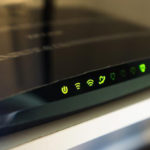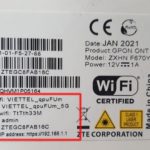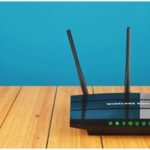Having a weak, slow, and laggy Wi-Fi can be very frustrating for users. It impacts and disrupts tasks and other internet usage needs. To solve this problem, you can refer to the ways to boost Wi-Fi speed that FPT Shop has collected.
The reasons for weak Wi-Fi speed
When using wireless Wi-Fi, most people experience the problem of slow and weak internet speed. Here are some common reasons that can make your home Wi-Fi slow.
Low bandwidth package
Using a low bandwidth package can also cause your Wi-Fi speed to be slow. If you are using a low bandwidth package, you will often experience weak and laggy internet speed.
Service provider issues
Service providers also have common issues such as broken undersea cables, which affect international internet access. Troubles with the network due to improper installation by the provider can also cause weak Wi-Fi.
Improperly installed Wi-Fi source
Wi-Fi/Modem devices that are improperly installed, placed in unsuitable locations, overloaded, or damaged can cause weak Wi-Fi signal. There are also many obstacles and interferences for Wi-Fi signals, such as construction materials (bricks, stones, concrete, metal…) that block Wi-Fi signals, routers placed on the ground or in areas with heavy Wi-Fi usage…
/fptshop.com.vn/uploads/images/tin-tuc/173718/Originals/cach-tang-toc-do-wifi-4.jpg)
Damaged connecting devices
If multiple devices connected to the same Wi-Fi network work fine, but your device (phone, computer…) is having issues like slow speed and internet connection problems, it could be due to your device being infected with a virus or being damaged…
Effective ways to boost Wi-Fi speed
If you are struggling to find out why your home network is slow, you can refer to the following ways to effectively enhance your Wi-Fi speed!
Change the position of the modem
The placement of the router is also a factor that affects the quality of Wi-Fi signals. Improperly placed modems with obstacles or being too far away from the receiving device, or conflicting with devices on the 5GHz or 2.4GHz frequency can all cause weak Wi-Fi speed. If you find that the position of the router is the reason for the weak Wi-Fi speed in your home, you can change the modem’s position as follows:
- Place it in the center of the house.
- Place it in an area with fewer signal obstructions, open space, and height.
- Keep the modem at least 1 meter above the ground.
- Place it far away from large metal objects and electronic devices that use the same frequency, heat dissipation, etc.
Change the Wi-Fi password and ID
Your Wi-Fi network can be stolen or hacked if you use fixed IDs and passwords for a long period of time. This can weaken the Wi-Fi signal, and even result in data loss. Since multiple devices share the same source, and network packages have limited data capacity, changing the Wi-Fi password is a way to improve internet speed. Secure your account by encrypting it with WPA2, WPA3… In addition, you should also turn off the WPS feature to prevent strangers from connecting to your Wi-Fi with just a button press.
/fptshop.com.vn/uploads/images/tin-tuc/173718/Originals/cach-tang-toc-do-wifi-6.jpg)
Change the package
As mentioned above, each internet package has its own data capacity. Therefore, depending on the internet usage needs of each family or company, you can upgrade to a higher internet package. In this case, please contact the helpline of the network provider you are using for specific instructions on changing your internet package!
Install a new antenna for the router
To improve signal reception, you can replace and adjust the antenna of the router without having to replace the entire router. Moreover, you can also use additional signal boosters and extenders (repeaters) such as: N Standard – Totolink EX200, TP-Link TL-WA850RE, Totolink EX100 150Mbps…
These devices will help spread the signal and extend the Wi-Fi network further and more stably to dead zones or areas with weak signals in your home. This is also an effective way to boost Wi-Fi speed that many people use.
Change the channel width
Changing the channel width is also a solution to boost the Wi-Fi speed of your devices. Due to the popularity of wireless networks, there are cases of overlapping frequency bands. The wider the channel width, the more susceptible it is to signal interference from older devices. Therefore, you should change the channel width by accessing Wireless Setting => Channel Width and adjust it accordingly.
/fptshop.com.vn/uploads/images/tin-tuc/173718/Originals/cach-tang-toc-do-wifi-2.jpg)
Update the router’s firmware
To maximize the speed of your router, you need to ensure that the router is regularly updated with the latest software and firmware provided by the manufacturer. Because the latest firmware updates often include security enhancements that help increase internet speed.
Switch to a different frequency band
Routers usually operate on two or three different frequency bands. Therefore, choosing the appropriate frequency band will improve the Wi-Fi speed in your home and make your internet connection faster. If your router is using dual-frequency bands, you can choose which band has fewer competing devices and is suitable for the internet usage needs of your devices.
- If you use the 5GHz band, the transmission speed is higher, but the signal becomes weak and can be attenuated when encountering obstacles.
- If you use the 2.4GHz band, the transmission speed is slower, but the signal can reach further and is less susceptible to signal interference.
/fptshop.com.vn/uploads/images/tin-tuc/173718/Originals/cach-tang-toc-do-wifi-7.jpg)
Restart the transmitting device
A simple way to boost Wi-Fi speed is to restart the Wi-Fi device. If you have a new router, it doesn’t necessarily need to be restarted frequently. However, if you have been using it for a while, restarting the router can solve issues such as overheating or hanging. To make it more convenient, you can set up an automatic restart using software like DD-WRT or Tomato.
Install the latest firmware
This is one of the ways to speed up Wi-Fi on receiving devices. Firmware is pre-programmed software stored on electronic devices such as routers or modems. It contains command codes to control the device’s operations and provides new features to fix bugs. Some software can replace the router’s firmware, such as DD-WRT, OpenWRT…
/fptshop.com.vn/uploads/images/tin-tuc/173718/Originals/cach-tang-toc-do-wifi-8.jpg)
Disable outdated protocols
Most new routers use the 802.11ac protocol, which significantly enhances the transmission speed of service providers’ networks. However, there are still some devices using older protocols like 802.11g. If your network devices still use the old B or G protocols, you should remove them and select the latest protocol to update features that improve internet speed.
Reduce unnecessary connected devices
The more devices connected, the weaker the Wi-Fi signal and the slower the Wi-Fi speed. The router has a limited bandwidth to serve multiple devices. Therefore, when multiple devices are connected simultaneously, the bandwidth is divided and not sufficient for each device. To solve this problem, you should turn off the Wi-Fi on devices that are not using the internet and use Ethernet cables to connect the devices that have fixed locations. Also, check the connections to see if anyone is using your Wi-Fi network without permission, and set up a password to protect it.
/fptshop.com.vn/uploads/images/tin-tuc/173718/Originals/cach-tang-toc-do-wifi-3.jpg)
Contact your service provider
If you have tried all the ways to boost Wi-Fi speed and still cannot improve the speed of your Wi-Fi connection, please contact the helpline of your internet service provider for home/office. Their staff will support you and guide you with specific instructions.
- FPT: Hotline: 19006600
- VNPT: Hotline: 18001091
- Viettel: Hotline: 18008090
Terms Used
- Router: A network device used to broadcast Wi-Fi for users to access the internet more conveniently on devices such as phones and laptops. It also receives, analyzes, and forwards internet data packets.
- Repeater: An extended Wi-Fi signal device that helps broadcast a stronger and more stable Wi-Fi signal. It is used in dead zones and areas with weak signals in homes or companies.
- Firmware: Pre-programmed software stored on electronic devices such as routers or modems. It contains command codes to control the device’s operations and provide new features for bug fixes on the device.
- Modem: A device that interfaces with a service provider’s internet network (ISP) to convert digital signals via fiber optic systems, coaxial cable systems, or telephone lines. It is also the connection to the international internet.
- Wi-Fi Frequency Band: The frequency range of electromagnetic waves that helps devices receive and transmit Wi-Fi signals wirelessly more easily. There are currently two commonly used bands: 5GHz and 2.4GHz.
- WPA2 or WPA3 Encryption: Standard encryption to secure Wi-Fi network accounts from remote attacks. WPA2 is the most widely used Wi-Fi security method. WPA3 is a newer Wi-Fi security method equipped with many security features such as transmission encryption and prevention of attacks by hackers.
- WPS (Wi-Fi Protected Setup): A network security standard to create security for home Wi-Fi networks. It was introduced in 2006, created by the Wi-Fi Alliance.
/fptshop.com.vn/uploads/images/tin-tuc/173718/Originals/cach-tang-toc-do-wifi-3(1).jpg)
Conclusion
Above are the ways to boost Wi-Fi speed that FPT Shop has collected. Hopefully, this information will help you understand the causes and solutions to Wi-Fi speed issues in the most effective way!
- 12 ways to speed up your computer efficiently
- 2 simple steps to speed up booting in Windows 7
To have a smoother internet usage experience, the quality of connected devices should also be considered. Therefore, to purchase genuine and quality electronic devices, visit FPT Shop now!
How to Find Out Who Is Connecting to Your Home WiFi Network
As the demand for wifi increases, more and more households have set up wifi in their homes. Unfortunately, there are those who take advantage of this by tapping into others’ wifi networks without authorization. In this article, we will be discussing how to identify if unauthorized parties are accessing your home wifi and steps you can take to prevent it from happening.




































